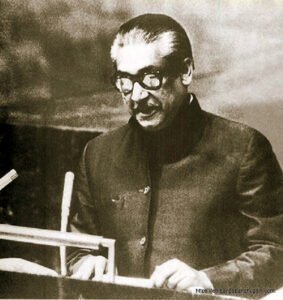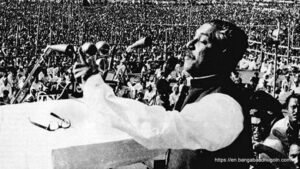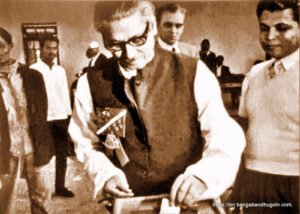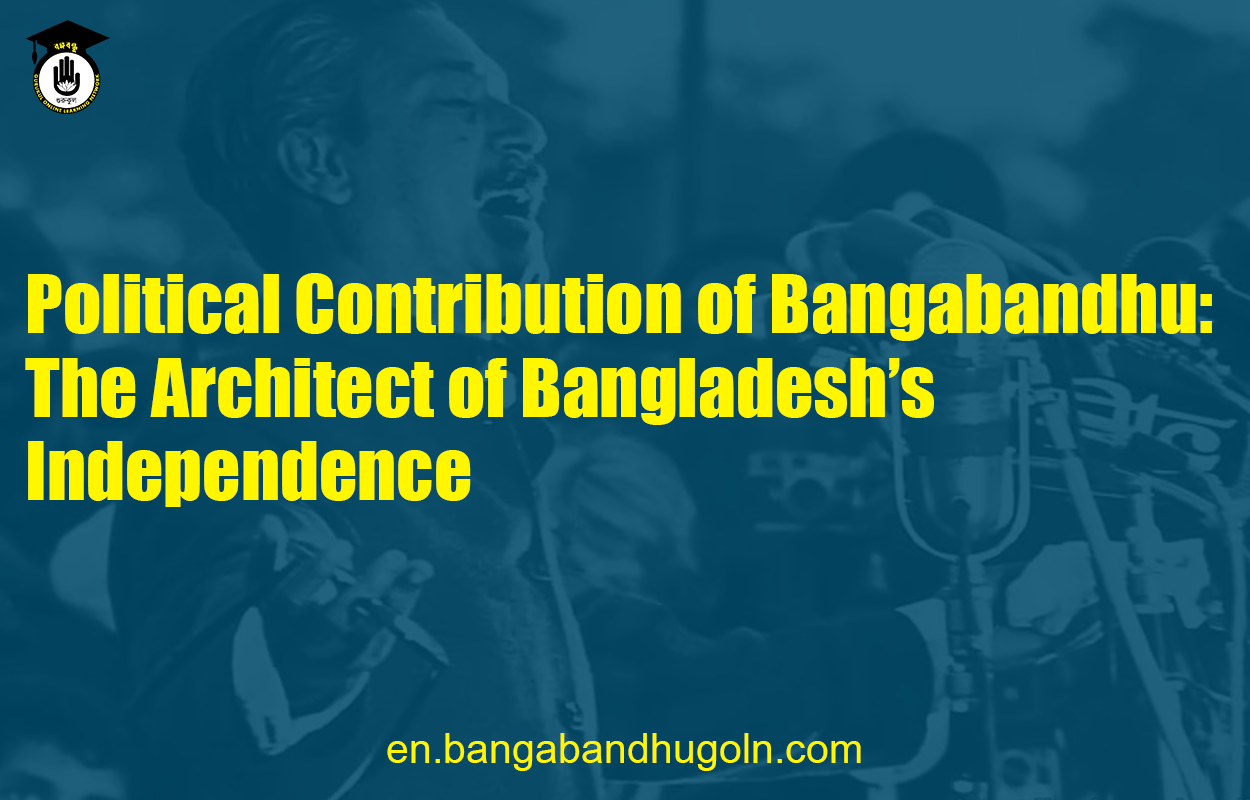Political Contribution of Bangabandhu. Bangabandhu Sheikh Mujibur Rahman, widely known as the “Father of the Nation,” is a central figure in the political history of Bangladesh. His relentless pursuit of justice, equality, and independence laid the foundation for the birth of Bangladesh. This article delves into the significant political contributions of Bangabandhu, highlighting his journey from a student leader to the architect of an independent nation.

Table of Contents
Political Contribution of Bangabandhu
Early Political Involvement
Sheikh Mujibur Rahman was born on March 17, 1920, in Tungipara, Gopalganj. His early education in Gopalganj and later in Kolkata’s Islamia College provided him the platform to get involved in student politics. His political journey began in the early 1940s when he joined the All India Muslim Students Federation and later the Muslim League. His dedication to the cause of the people was evident from the beginning, as he actively participated in the Pakistan Movement.
Formation of Awami League
In 1949, Sheikh Mujibur Rahman co-founded the Awami Muslim League, which later became the Awami League. This party was instrumental in championing the rights of Bengalis in East Pakistan. As the party’s General Secretary, he played a crucial role in mobilizing the masses and advocating for autonomy and self-determination.
Language Movement
One of the pivotal moments in Bangabandhu’s political career was his involvement in the Language Movement of 1952. When the Pakistani government attempted to impose Urdu as the sole national language, Bangabandhu stood firmly for the recognition of Bengali. His activism and leadership during this period galvanized the Bengali population and laid the groundwork for the broader struggle for autonomy.
Six-Point Movement
In 1966, Bangabandhu presented the historic Six-Point Movement, which outlined demands for greater autonomy for East Pakistan. These points included control over the economy, defense, and currency. The Six-Point Movement became the blueprint for the Bengali nationalist movement and highlighted the economic and political disparities between East and West Pakistan.
The Pakistani authorities responded with repression, arresting Bangabandhu and other leaders. However, the movement continued to gain momentum, with the people of East Pakistan rallying behind Bangabandhu’s vision for self-governance.
1970 General Elections
The 1970 general elections marked a significant turning point in the political landscape of Pakistan. The Awami League, under Bangabandhu’s leadership, won a landslide victory in East Pakistan, securing 167 out of 169 seats. This victory underscored the overwhelming support for Bangabandhu’s Six-Point agenda and the demand for autonomy.
However, the Pakistani government refused to transfer power, leading to widespread unrest and escalating tensions between East and West Pakistan.
Declaration of Independence
On March 7, 1971, Bangabandhu delivered a historic speech at the Racecourse Ground (now Suhrawardy Udyan) in Dhaka, where he declared, “The struggle this time is a struggle for emancipation. The struggle this time is a struggle for independence.” This speech became a rallying cry for the Bengali people and set the stage for the Liberation War.
Following the crackdown by the Pakistani military on March 25, 1971, Bangabandhu was arrested and taken to West Pakistan. However, before his arrest, he declared Bangladesh’s independence. His leadership and vision continued to inspire the Mukti Bahini (Liberation Army) and the people of Bangladesh throughout the nine-month-long war.

Leadership in Independent Bangladesh
Upon his release and return to Bangladesh in January 1972, Bangabandhu faced the enormous task of rebuilding a war-torn nation. As the first President and later the Prime Minister of Bangladesh, he focused on national reconstruction, economic development, and establishing a democratic framework.
1. Constitution of Bangladesh
One of Bangabandhu’s most significant contributions was the drafting and adoption of the Constitution of Bangladesh in 1972. The constitution enshrined the principles of nationalism, socialism, democracy, and secularism, reflecting Bangabandhu’s vision for a progressive and inclusive society.
2. Economic Reforms
Bangabandhu implemented various economic reforms aimed at revitalizing the war-ravaged economy. He nationalized key industries and financial institutions to stabilize the economy and ensure state control over vital sectors. His policies focused on agrarian reform, industrialization, and social welfare.
3. Foreign Policy
Bangabandhu’s foreign policy was centered on non-alignment and fostering friendly relations with other countries. He sought international recognition and support for the newly independent Bangladesh. His diplomatic efforts led to Bangladesh’s membership in the United Nations and the establishment of relations with major global powers.
Challenges and Assassination
Despite his significant contributions, Bangabandhu’s leadership faced numerous challenges. The country struggled with political instability, economic difficulties, and internal dissent. His efforts to maintain law and order led to the imposition of a state of emergency and the establishment of a one-party state, which drew criticism from various quarters.
On August 15, 1975, Bangabandhu Sheikh Mujibur Rahman, along with most of his family members, was assassinated in a military coup. His death was a tragic blow to the nation, plunging Bangladesh into a period of political turmoil and uncertainty.

Legacy
Bangabandhu Sheikh Mujibur Rahman’s legacy as the Father of the Nation remains deeply ingrained in the hearts of the Bangladeshi people. His vision for an independent and sovereign Bangladesh, his unwavering commitment to the people’s welfare, and his indomitable spirit continue to inspire generations.
1. Nationalism and Identity
Bangabandhu’s leadership instilled a strong sense of nationalism and pride among Bengalis. His struggle for independence and his contributions to the nation’s identity have cemented his place as a symbol of resilience and determination.
2. Economic and Social Progress
The foundations laid by Bangabandhu in terms of economic policies, social reforms, and infrastructural development have had a lasting impact on Bangladesh’s growth trajectory. His vision for a self-reliant and progressive nation continues to guide policymakers and leaders.
3. Inspiration for Future Generations
Bangabandhu’s life and political career serve as an enduring source of inspiration for future generations. His principles of justice, equality, and democracy are reflected in the aspirations of the Bangladeshi people and their ongoing efforts to build a prosperous and inclusive society.
Bangabandhu Sheikh Mujibur Rahman’s political contributions are monumental in the history of Bangladesh. From his early involvement in student politics to his leadership in the struggle for independence and his efforts to rebuild the nation, his legacy is one of courage, vision, and unwavering dedication to the people. As Bangladesh continues to progress, the ideals and principles of Bangabandhu remain a guiding light, reminding the nation of its enduring commitment to freedom, justice, and development.
Read more:
